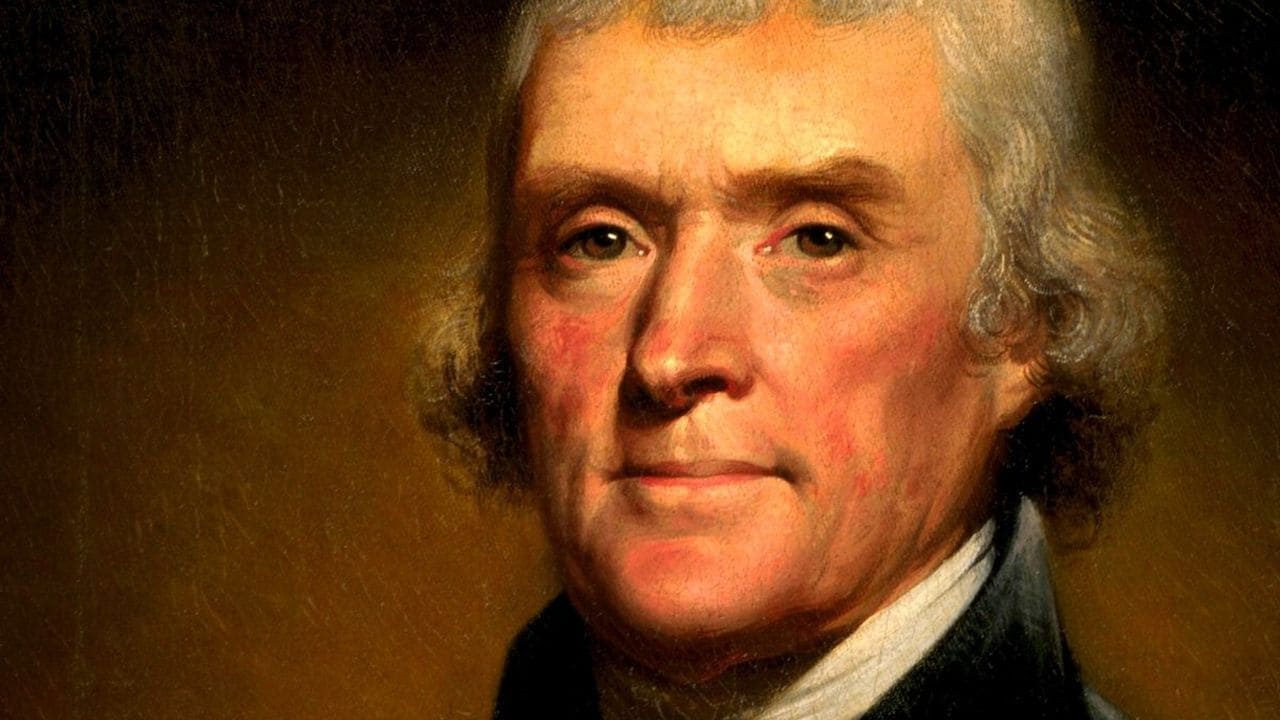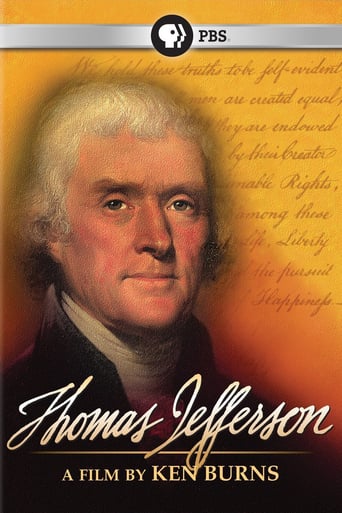

As always, this is a top-notch biography by Ken Burns. Lots of interesting and often famous folks are interviewed, lots of paintings and photos are employed with a moving camera and nice evocative music is used to spin the story of Thomas Jefferson's life.The film is broken into two parts when I saw it streaming on Netflix. The first portion is about Jefferson's life from birth until the time of the French Revolution in 1789 (which he was a huge supporter of at the time). Now this film is NOT a white-washing of the man, as it talks about his many amazing gifts but also his intense failing when it comes to human rights and the lack of rights accorded to slaves. While he DID push for this when he was younger, he quickly abandoned this when he saw resistance--and it just didn't seem that important an issue to him. Other topics covered include his family tragedies, the Declaration of Independence, the Revolution and religious liberty. The second portion is about the time of the creation of the government of the new United States up until the death of Jefferson in 1826. Jefferson was serving as a diplomat in France while the Constitution was created and adopted. And, when he returned he was appointed to President Washington's cabinet as the first Secretary of State. However, this was not a great match, as the Federalists (who dominated the Cabinet), had a slightly different view of the role of government--and this ended up causing serious divisions as Washinton's administration and Jefferson eventually quit. Washington had envisioned a system with no political parties--but men with strong views like Hamilton and Jefferson ended up doing just that--creating the first political parties. Eventually, Jefferson was roused from his early retirement when he was elected Vice President under John Adams--and his problems with the Federalists continued. Eventually, he'd have the last laugh as he and his Democratic-Republicans came into power and stayed in power for decades to come (with few interruptions). And, oddly, Jefferson's notions of a small and very limited government were things he violated when he was responsible for the Louisiana Purchase! So much for core political values....Then, following his presidency is a very lengthy portion of the film devoted to his retirement years. His creation of the University of Virginia, financial difficulties and his correspondence (among other things) are the subject of this final portion of the film.By the way, this film seems to give undo credit for the Declaration of Independence to Jefferson. I am NOT trying to discredit Jefferson, but the document didn't just appear out of no where--the context is missing. His writing of the Declaration was STRONGLY influenced by George Mason's Declaration of Rights for Virginia--as well as other documents. In addition, to Jefferson's dismay, his original draft was changed MANY times by the Continental Congress. But this is barely mentioned in the film--and none of the previous Declarations (several States had already issued their own) were mentioned. As a retired history teacher, I have picked up these things over the years--and they are not common knowledge. This is NOT a major criticism--as apart from this the film is exceptional and quite engaging.
... View MoreFirst, let me preface my review...Thomas Jefferson was a man that I admired as a kid. When I was young, I read many of his biographies and loved all that he did, particularly the articulate ways the Renaissance Man expressed the nation's desire for freedom and equality. He was my favorite Founding Father. I still remember when I first learned that he owned hundreds slaves, in direct contradiction to his written words. It was shocking, as I discovered that one of my patriotic heroes had such a double standard in his life. Having said all that, I hoped that this documentary would accomplish two things: Unearth the truth, and dive deeper into this intriguing man's life. Both goals were met.Using narration and the perspective of multiple historians, the documentary covers virtually every significant aspect and passion of Jefferson's life, including both common knowledge stories and lesser known events. Among the more interesting lore are his early political years, the vastness of his knowledge, and his late-life correspondence with erstwhile rival John Adams. Controversial issues such as Jefferson's alleged affair and illegitimate children are addressed in a fair way. No definitive conclusion is stated, but all opinions are given, and those thoughts match up with the information I have found. The only thing lacking was a snapshot of Jefferson's religious beliefs. To my knowledge, he was a Deist rather than a true Christian. That point was alluded to, but never elaborated upon.A theme of the documentary was the contradiction that seemed to run through Jefferson's life. The primary instance was his duplicity in being a champion for freedom and equality, yet simultaneously owning hundreds of slaves. To compound matters, Jefferson also harbored complex racist tendencies, although not in a malicious way. Given his time period, I don't know that these pitfalls taint his reputation, but they definitely tint it a darker hue.I won't elaborate on all of the other stories told, but many were new and fascinating. History such as his battle to be elected president, and stories like the fact that his tombstone contains no mention of his presidency, or his financial troubles late in life. All of this information adds up to paint what appears to be an unbiased and accurate portrait of one of the country's great yet flawed men.If you've seen any of Ken Burns's work (Baseball, The Civil War, etc.), then you are familiar with his trademark style of filmmaking that is present here. He once again utilizes the panning of still photographs and paintings, often accompanied by the appropriate sound effects. A slight twist is that Burns also uses many beautiful shots, both still and action, of modern-day Monticello and other places. This is a wise choice, as those pictures, which are recent but also period, add a vivacity to the film. The music was also standard Ken Burns. He picked a handful of tunes, including hymns and patriotic songs, then had them played in a variety of ways to provide a suitable soundtrack. His choice of the hymn "Be Thou My Vision" as a primary theme did strike me as odd though, considering Jefferson's strong Deist beliefs that contradicted traditional Christianity. Aside from the three-hour documentary, there are two short featurettes on the DVD. The first is an eight-minute glimpse inside Burns's filmmaking world. The second is a ten-minute conversation with Burns about his work. Both are definitely worth watching if you like any of his films, as they provide good insight into his processes. If anything, the two featurettes are too short, but worthwhile nonetheless.The downside to this doc was that it didn't suck you in. It felt more like reading a good history textbook. Interesting stuff, but occasionally I zoned out. If you don't have an interest in Jefferson or early American history, then you will probably find the film dry and boring.Even if you are a history buff, I don't know that you need to purchase this DVD. It's good stuff, but I don't feel it can be viewed multiple times. I borrowed it from the library, and that (or a rental) is my recommended route.Bottom Line: This is for history buffs and for people interested in Thomas Jefferson. 8 of 10 from one who had that interest. Others will probably be bored.
... View MoreKen Burns and company do an excellent job of giving us the whole Jefferson, warts and all. But one begins to wonder why they didn't do a documentary about someone else of the times, someone who didn't own slaves, didn't deport all Eastern Indians to the West, didn't build a museum for his personal abode, didn't praise the French Revolution in the most immoderate terms and didn't sink deep into debt. Whether he impregnated slave Sally is almost tangential and immaterial. He "did" so many other things! It is often said, one shouldn't judge a historical figure by today's exacting standards. Yet it is also said, by those same people, that time must pass to allow us to objectively evaluate today's leaders. And as if this weren't enough, one also hears these souls denounce "moral relativism". Go figure. But one needn't judge Jefferson by today's "politically correct" standards. One can be content with judging him by his own time's and, indeed, by his very own standards. And, one can emulate his own extremely harsh judgments of fellow founding father Alexander Hamilton. It's disrespectful to the founding fathers not to judge them. They judged each other, and they wanted to be judged. This good documentary is marred by interruptions from overexposed, self-important pundits from all corners of the vaunted political spectrum, a common documentary flaw. Interpretation and opinion should be served on a separate plate - please! A little more verve and humor would have added spice and made for a less reverential opus. Jefferson wrote so many letters. There should have been more quotations from the horse's mouth.
... View MoreI am a fan of Ken Burns films, but "Thomas Jefferson" is probably the nadir of the talking-head living-history documentary style he favors. In many respects "Thomas Jefferson" is a beautiful film, and it is clearly the work of intelligent people. Ultimately it inspires me to visit Monticello, which is admirably photographed. It fails to answer the question it poses at the outset - whether Jefferson the lover of Liberty can be reconciled with Jefferson the Master of Slaves - and by default suggests that raising this question is the film's chief contribution to Jeffersonian discourse. It's a timely question, but it isn't new. The mood of the film is outrageously depressive, a sedate musical score of American chestnuts underscoring lethargic readings from Jefferson's writings, and images of Monticello, slaves, Jefferson (portrait), historically significant parchments, John Adams (portrait), George Washington (portrait), etc. If this film is anything specific, it is a memorial service for the myth of Jefferson. I don't like it, but I appreciate the film maker's effort and the contributions of scholars involved in the project. A related Ken Burns biographical film, "Lewis and Clark," is similar in tone but less confused and more forthright in its storytelling. See it.
... View More